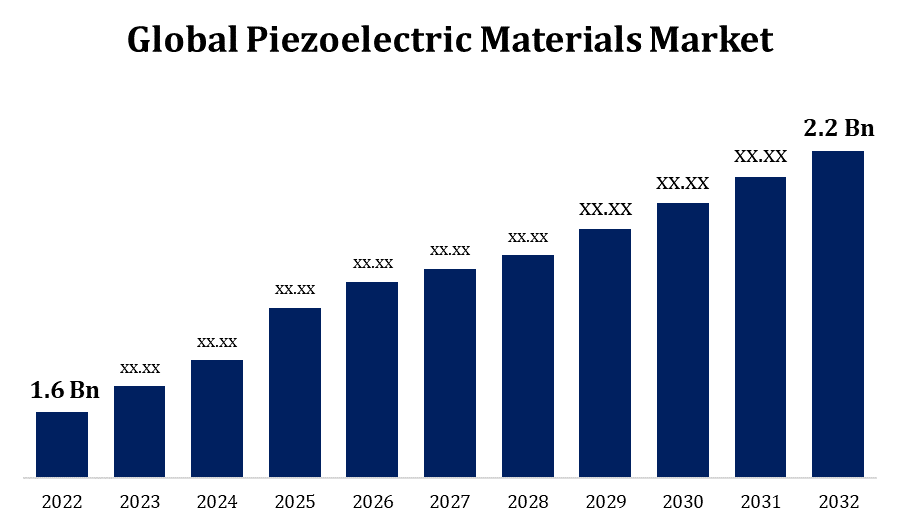Global Piezoelectric Materials Market Size By Product (Ceramics, Polymers, Composites), By Application (Actuators, Sensors, Motors), By End-use (Automotive, Healthcare, Consumer Goods), By Region, And Segment Forecasts, By Geographic Scope And Forecast to 2032
Industry: Semiconductors & ElectronicsGlobal Piezoelectric Materials Market Insights Forecasts to 2032
- The Piezoelectric Materials Market Size was valued at USD 1.6 Billion in 2022.
- The Market Size is Growing at a CAGR of 5.3% from 2022 to 2032
- The Global Piezoelectric Materials Market is expected to reach USD 2.2 Billion by 2032
- Asia Pacific is expected to grow the fastest during the forecast period

Get more details on this report -
The global Piezoelectric Materials Market Size is expected to reach USD 2.2 Billion by 2032, at a CAGR of 5.3% during the forecast period 2022 to 2032.
The piezoelectric materials market has been rapidly expanding. The market is being propelled forward by rising demand for these materials in a variety of applications such as sensors, actuators, and energy harvesting devices. The IT industry is always looking for materials that can do more, and piezoelectric materials fit the bill perfectly. Healthcare, automotive, and electronics are all key contributors to market growth. Nanotechnology breakthroughs have also brought up new possibilities for piezoelectric materials, making them even more appealing to researchers and manufacturers. In a word, the piezoelectric materials market has a bright future, due to increased applications and innovation.
Piezoelectric Materials Market Value Chain Analysis
Suppliers of raw materials such as ceramics, crystals, and polymers, which are required for the production of piezoelectric materials, are at the basis. The availability and quality of these raw materials have an impact on the entire value chain. These are the alchemists who use procedures like poling and sintering to transform basic materials into piezoelectric materials. Their production efficiency and ability to innovate have an impact on market competitiveness. These firms transform piezoelectric materials into particular components such as sensors, actuators, and transducers. Their knowledge of designing and manufacturing functional components is critical. These piezoelectric-equipped items are used in a variety of industries, including healthcare, automotive, consumer electronics, and others. Their needs and desires impact market dynamics.
Piezoelectric Materials Market Opportunity Analysis
The rising usage of piezoelectric materials in medical equipment such as ultrasound transducers and wearable health tech creates a substantial growth opportunity in the healthcare sector. The increased emphasis on renewable energy has created opportunities for piezoelectric materials in energy harvesting applications. Imagine gathering energy from vibrations and movements and using it to power electronic devices - it's like transforming every stride into a potential power source. As cities grow smarter, there is a greater demand for sensors and actuators for applications such as structural health monitoring, traffic control, and environmental sensing. Piezoelectric materials have the potential to play a critical role in these advancements. The consumer electronics business is thirsty for new ideas. Piezoelectric materials can improve the functionality and efficiency of devices ranging from touchscreens to haptic feedback systems, opening up a world of possibilities. Piezoelectric materials may find applications in energy-efficient systems, sensors, and even in-cabin comfort applications as the automobile industry shifts towards electric vehicles and smart technologies.
Global Piezoelectric Materials Market Report Coverage
| Report Coverage | Details |
|---|---|
| Base Year: | 2022 |
| Market Size in 2022: | USD 1.6 Billion |
| Forecast Period: | 2022-2032 |
| Forecast Period CAGR 2022-2032 : | 5.3% |
| 2032 Value Projection: | USD 2.2 Billion |
| Historical Data for: | 2018-2021 |
| No. of Pages: | 200 |
| Tables, Charts & Figures: | 100 |
| Segments covered: | By Product, By Application, By End-use, By Region |
| Companies covered:: | 3M Company (U.S.), De Puy Synthes (U.S.), CoorsTek, Inc. (U.S.), CeramTec GmbH (Germany), KYOCERA Corporation (U.S.), Institut Straumann AG (Switzerland), Morgan Advanced Materials (U.K.), APC International, Ltd. (U.S.), Materion Corporation (U.S.), Elan Technology (U.S.), and Others. |
| Growth Drivers: | Implementation of automation systems by major manufacturers |
| Pitfalls & Challenges: | COVID-19 Empact, Challenges, Future, Growth, & Analysis |
Get more details on this report -
Market Dynamics
Piezoelectric Materials Market Dynamics
Implementation of automation systems by major manufacturers
Automation improves precision and uniformity in the manufacturing of piezoelectric materials. This efficiency not only lowers manufacturing costs but also matches the increasing demand for these materials in a variety of industries. Automated systems improve quality control processes, guaranteeing that piezoelectric materials satisfy specifications. Consistent quality is critical, particularly in areas where accuracy is required, such as medical devices or aerospace. The time it takes to bring new and improved piezoelectric materials to market is greatly decreased using automated production processes. This adaptability is critical in order to keep up with the fast-paced tech business. While setting up automation systems requires an initial investment, the long-term benefits include lower labour expenses. This cost-effectiveness helps to the market's overall competitiveness of piezoelectric materials.
Restraints & Challenges
The production of high-quality piezoelectric ceramics can be difficult and entail costly raw ingredients. Keeping production costs under control while maintaining quality is a tough balancing act. The materials that can be used in piezoelectric ceramics are not limitless. This constraint can stifle innovation and make satisfying the varying requirements of many applications difficult. Piezoelectric ceramics have mechanical constraints and can be brittle. Finding or inventing materials that transcend these limits is difficult in applications where durability and resistance to mechanical stress are crucial. Alternative materials and technologies that compete with or surpass standard piezoelectric ceramics may develop as technology advances. Keeping up with the pace of invention is a constant task.
Regional Forecasts
North America Market Statistics

Get more details on this report -
North America is anticipated to dominate the Piezoelectric Materials Market from 2023 to 2032. North America, being a technology and innovation hotspot, has a significant demand for piezoelectric materials in the electronics sector. Sensors in consumer electronics to industrial equipment are examples of applications. The healthcare business in North America is a primary driver of piezoelectric material demand. This expansion is aided by ultrasound instruments, diagnostic equipment, and numerous medical sensors. The usage of piezoelectric materials in sensors, actuators, and fuel injection systems is increasing as the automotive industry evolves. With the increased emphasis on electric vehicles and smart technologies, this trend is likely to continue. Given the tech-savvy character of North American customers, there is a growing desire for creative and efficient consumer devices utilising piezoelectric materials.
Asia Pacific Market Statistics
Asia Pacific is witnessing the fastest market growth between 2023 to 2032. The piezoelectric materials industry reflects Asia Pacific's status as a manufacturing powerhouse. Countries such as China, Japan, and South Korea contribute significantly to the production and export of these commodities. Some of the world's leading electronics firms are based in the region. The consumer electronics sector is driving up demand for piezoelectric materials in the creation of sensors, actuators, and other electronic components. The Asia Pacific healthcare sector is rapidly expanding. The demand for piezoelectric medical devices and equipment, such as ultrasound instruments, is increasing. South Korea, China, and Japan have tech-savvy populations that are quick to adopt new technologies.
Segmentation Analysis
Insights by Product
Ceramics segment accounted for the largest market share over the forecast period 2023 to 2032. Piezoelectric ceramics are used in a variety of industries, and their adaptability makes them appropriate for a wide range of applications. Ceramics have a wide range of applications, from sensors in consumer electronics to medical devices and industrial applications. The need for electronic devices with improved functionality is increasing. Piezoelectric ceramics, which are used in sensors and actuators, are becoming more popular in the electronics sector. The transition in the automobile sector towards electric vehicles and the incorporation of smart technology has accelerated the use of piezoelectric ceramics. They are used in fuel injection systems, sensors, and other components that contribute to the technological achievements of the industry.
Insights by Application
Actuators segment accounted for the largest market share over the forecast period 2023 to 2032. Piezoelectric ceramics are highly valued for their ability to respond quickly to voltage changes, making them suitable for precision control applications. This property is especially useful in actuators, where exact movement and responsiveness are critical. The demand for miniaturised actuators has increased as industries move towards smaller and more compact systems. Piezoelectric ceramics are well-suited for applications needing compact actuation systems due to their small size and high force output. Piezoelectric actuators have been used in a variety of automobile applications, including fuel injectors, exhaust system management, and adaptive suspension systems. The growing trend towards electric vehicles and smart technology drives the demand for piezoelectric actuators even more.
Insights by End Use
Automotive segment accounted for the largest market share over the forecast period 2023 to 2032. As the automobile industry transitions to electric vehicles, piezoelectric ceramics are playing a critical role. They are employed in components like as fuel injectors to help optimise EV efficiency. Piezoelectric ceramics are used in sophisticated fuel injection systems. The exact control they provide over fuel distribution adds to greater fuel efficiency, lower emissions, and engine performance. Adaptive suspension systems in high-end vehicles use piezoelectric ceramics to alter damping levels in real-time, offering a smoother and more controllable ride. The precision and reactivity of piezoelectric ceramics are critical in the integration of smart technologies in vehicles, such as parking assist systems and advanced driver assistance systems (ADAS).
Recent Market Developments
- In 2020, the Indian Institute of Technology developed a novel method for increasing the power output of piezoelectric materials.
Competitive Landscape
Major players in the market
- 3M Company (U.S.)
- De Puy Synthes (U.S.)
- CoorsTek, Inc. (U.S.)
- CeramTec GmbH (Germany)
- KYOCERA Corporation (U.S.)
- Institut Straumann AG (Switzerland)
- Morgan Advanced Materials (U.K.)
- APC International, Ltd. (U.S.)
- Materion Corporation (U.S.)
- Elan Technology (U.S.)
Market Segmentation
This study forecasts revenue at global, regional, and country levels from 2023 to 2032.
Piezoelectric Materials Market, Product Analysis
- Ceramics
- Polymers
- Composites
Piezoelectric Materials Market, Application Analysis
- Actuators
- Sensors
- Motors
Piezoelectric Materials Market, End User Analysis
- Automotive
- Healthcare
- Consumer Goods
Piezoelectric Materials Market, Regional Analysis
- North America
- US
- Canada
- Mexico
- Europe
- Germany
- Uk
- France
- Italy
- Spain
- Russia
- Rest of Europe
- Asia Pacific
- China
- Japan
- India
- South Korea
- Australia
- South America
- Brazil
- Argentina
- Colombia
- Middle East & Africa
- UAE
- Saudi Arabia
- South Africa
Need help to buy this report?